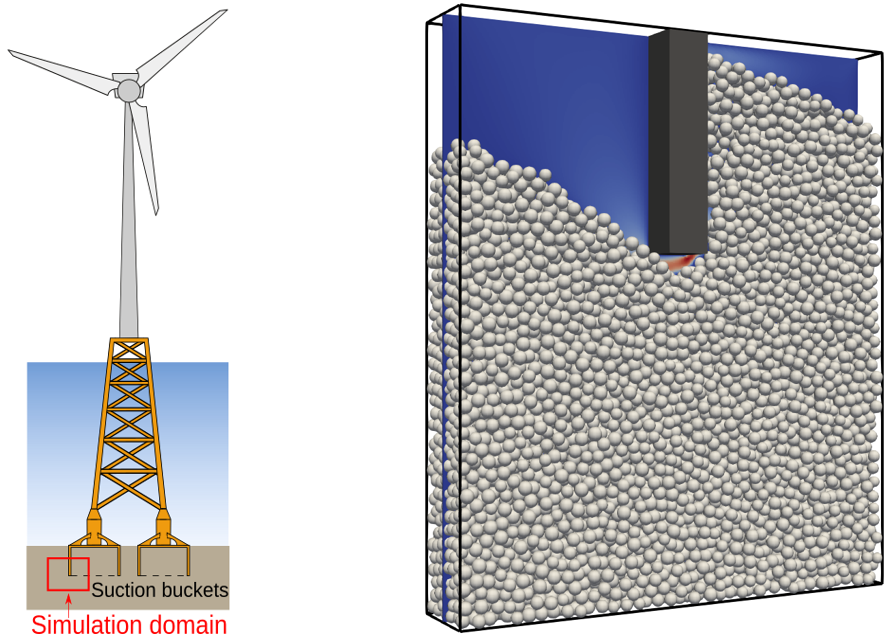
Source: BAM
Project period
01/01/2023 - 31/12/2026
Project type
EU project
Project status
Closed
Description
During the installation of a suction bucket for offshore wind turbine foundations, piping erosion imposes a massive risk. We employ a numerical simulation to gain a deeper understanding of this complex phenomenon and eventually help to prevent piping erosion.
Location
Bundesanstalt für Materialforschung und -prüfung (BAM)
Unter den Eichen 87
12205 Berlin
Source: BAM
Source: BAM
Source: BAM
This project employs the discrete element method and the lattice Boltzmann method to run a fully-resolved coupled fluid-particle simulation. The simulation is implemented in the highly parallel multiphysics framework waLBerla. EuroHPC JU supercomputers are used to perform large-scale simulations.
Source: BAM
Project coordination: Königliche Technische Hochschule
Consortium: 8 international partners from Science
Funding: This project receives funding from the European High Performance Computing Joint Undertaking
In this task, a fluid-solid coupled micromechanical simulation of a seabed foundation will be run using the waLBerla framework for the analysis of localized fluidization (so-called piping erosion) during the installation of a suction bucket for the basement of an offshore wind turbine. The fully-resolved simulation will involve a discrete DEM representation of the solid phase (i.e. the structural element and the single grains of the sandy seabed) and an LBM hydrodynamic model of the percolating water. A preliminary coupled model will at first aim to simulate the results of a physical model test in reduced-scale (validation stage with available laboratory tests), while the grand application in 3D will focus on the local phenomena taking place around a representative cut of the full-scale foundation during the first meters of the suction-driven installation. To enable the latter scenario, a major task will concern at first the creation of the initial seabed conditions in terms of a representative granular fabric involving layered deposition, granular cementation and a realistic state of intergranular forces and relative density throughout the embedment depth. The subsequent simulation of the grain-resolved flow will pose a significant computational challenge. The task will be attacked using the Euler-Lagrangian coupling functionality of waLBerla using geometrically resolved particles that can be generated with specified size and shape distributions. The coupling itself will employ the momentum exchange method which must be additionally improved by lubrication models. For more details, see: https://ceec-coe.eu/localized-erosion/.
Partner
Königliche Technische Hochschule
Aristoteles-Universität Thessaloniki
Barcelona Supercomputing Center
Friedrich-Alexander-Universität Erlangen-Nürnberg
Universität Stuttgart
Universität Umeå
Technische Universität Dänemarks
Funding
European High Performance Computing Joint Undertaking


